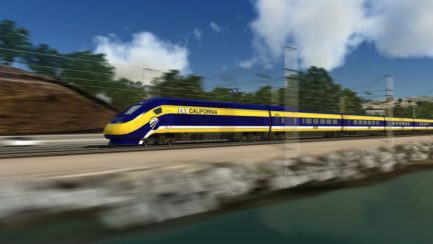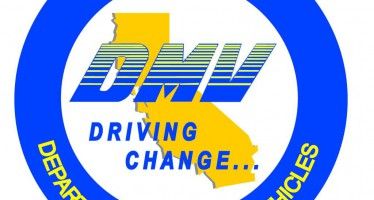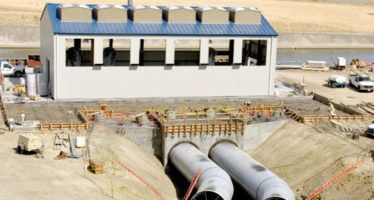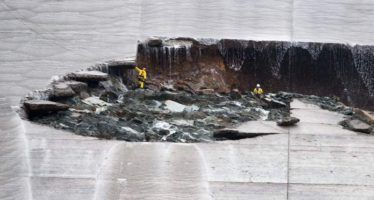Fight escalates over federal funds for CA bullet train
 The battle between California and the Trump administration over $3.4 billion in federal funding that was committed nearly a decade ago to the state’s bullet-train project escalated last week when a key state leader rejected federal criticisms of the project’s progress.
The battle between California and the Trump administration over $3.4 billion in federal funding that was committed nearly a decade ago to the state’s bullet-train project escalated last week when a key state leader rejected federal criticisms of the project’s progress.
California High-Speed Rail Authority Chief Executive Brian Kelly sent two letters defending Gov. Gavin Newsom’s January remarks that he would focus on completing a 119-mile segment now being built in the Central Valley – backing away from a promise to state voters in 2008 and to the federal government in 2009 and 2010 to build a statewide bullet-train system. Kelly said the state was comporting with key federal regulations.
The limited segment linking Bakersfield and Merced is expected to cost up to $18 billion. Were it ever built, the costs of the originally envisioned statewide bullet-train system – ranging along the coast from San Francisco to Los Angeles to San Diego and inland to Sacramento – could have been 10 times as much or more. The cost of each end of the Los Angeles to San Francisco segment was so extreme that in 2012, the rail authority gave up on true high-speed rail in those links – opting for a “blended” system that relied on regular rail to cover the final 45 miles or so into each of the population centers.
The Trump administration has already canceled a $929 million grant issued to the project in 2010 by the Obama administration. It has indicated it hopes to recover $2.5 billion the federal government has already allocated to California as part of the 2009 economic stimulus package on the grounds that the project is far behind schedule and no longer meets promises of sound planning and financial viability made to secure the $2.5 billion.
But Kelly argued that the Federal Railroad Administration under the Obama administration and for the first two years of Trump’s administration concluded that the project was meeting minimum benchmarks to qualify for federal funding.
“Any clawback of federal funds already expended on this project would be disastrous policy,” Kelly wrote. “It is hard to imagine how your agency – or the taxpayers – might benefit from partially constructed assets sitting stranded in the Central Valley of California.”
LAO questioned project’s finances in 2010
Kelly’s letter hinted at but did not explicitly suggest the DOT’s attempts to recover the $2.5 billion were motivated by President Donald Trump’s two-year-plus war of words with California’s governors, which began under Jerry Brown and has continued with Gavin Newsom. In that span, state Attorney General Xavier Becerra has filed or joined in nearly 50 lawsuits against the Trump administration. Newsom has called the targeting of California’s project politically motivated.
Kelly’s argument that the “clawback” of that much in federal funds would be unprecedented appears correct. But the state’s arguments are weakened by the difficulty it will face in asserting it acquired the federal funds while acting in good faith. Despite telling the U.S. Department of Transportation repeatedly, beginning in 2009, that the bullet-train project was in good shape financially, rail authority officials couldn’t persuade state watchdogs that was the case in the same time frame.
In January 2010, the Legislative Analyst’s Office warned the authority didn’t have a legal business plan because it anticipated that revenue or ridership guarantees could be provided to attract private investors to help fund the project. Because such guarantees amounted to a promise of subsidies if forecasts weren’t met, they were illegal under Proposition 1A, the 2008 state ballot measure providing $9.95 billion in bond seed money for the then-$33 billion project.
The LAO and the California State Auditor’s Office have been uniformly critical of the project for a decade.
Rep. McCarthy: Move $ to other transportation projects
If the Trump administration takes steps to recover the $2.5 billion by withholding unrelated federal dollars bound for California, the dispute seems certain to end up in federal court.
Meanwhile, the California congressman whose district has arguably been most affected by early construction of the bullet train on Thursday introduced a bill that would “repurpose” all $3.4 billion in federal funds for the project to water infrastructure projects in California and other Western states. The measure by House Minority Leader Kevin McCarthy, R-Bakersfield, faces long odds in a chamber in which Democrats retook control in January.
Chris Reed
Chris Reed is a regular contributor to Cal Watchdog. Reed is an editorial writer for U-T San Diego. Before joining the U-T in July 2005, he was the opinion-page columns editor and wrote the featured weekly Unspin column for The Orange County Register. Reed was on the national board of the Association of Opinion Page Editors from 2003-2005. From 2000 to 2005, Reed made more than 100 appearances as a featured news analyst on Los Angeles-area National Public Radio affiliate KPCC-FM. From 1990 to 1998, Reed was an editor, metro columnist and film critic at the Inland Valley Daily Bulletin in Ontario. Reed has a political science degree from the University of Hawaii (Hilo campus), where he edited the student newspaper, the Vulcan News, his senior year. He is on Twitter: @chrisreed99.
Related Articles
Once-undocumented claim half of new CD drivers licenses
Roiled by immigration fears on both sides, California supplied drivers licenses to big numbers of the otherwise undocumented, further sharpening
CA Supreme Court removes obstacle to Delta tunnel project
The California Supreme Court cleared a big obstacle to Gov. Jerry Brown’s plan to tunnel more Delta water out of Northern
California seeks fourth federal disaster declaration
Still reeling from a wild weather season, California chalked up a fourth request for federal disaster aid, as Gov.




